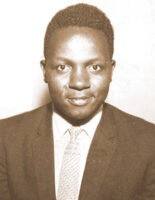
Stanley Kenneth Njindo Matiba became the first Minister ever to resign from President Daniel arap Moi’s Cabinet in 1989 after the mlolongo elections of 1988. He had been in Parliament since 1983.
He became the Member of Parliament for Mbiri (later Kiharu) Constituency in Murang’a District in 1983 and was later appointed to the Cabinet as Minister for Culture and Social Services. He remarked, “At no time had I ever aspired to be a Cabinet Minister.” The President had not consulted Matiba on the appointment. He later headed other ministries: Health, Transport and Communications, and Public Works. He vied for the presidency in 1992, emerging second. He was MP for Kiharu from 1992 to 1997 while serving as Leader of the Opposition.
While he was Minister for Transport and Communications, he protested against the way the KANU party elections had been conducted in the Murang’a branch. When his protestations were ignored, he resigned from his Cabinet post. In 1990 Matiba began campaigning for the return of a multiparty political system in Kenya. He was detained for agitating for multiparty politics along with his co-campaigner, Charles Rubia, who was held without trial at the Kamiti Maximum Security Prison.
During his time in detention, Matiba suffered a stroke and after his release spent a lengthy period in the United Kingdom undergoing medical treatment. He returned to Kenya in May 1992. Although he was not fully recovered, he joined Jaramogi Oginga Odinga, Masinde Muliro and others at the newly-formed Forum for the Restoration of Democracy (FORD). This was a strong Opposition movement formed after Section 2A of the Constitution was repealed.
Matiba launched a strong campaign to be the FORD presidential candidate. However, before the elections, FORD split into two factions: one that he led was renamed FORD-Asili and the other was known as FORD-Kenya, led by Odinga.
As chairman of FORD-Asili, Matiba took second place after Moi in the 1992 General Election and easily won the Kiharu parliamentary seat. He however ignored parliamentary sessions and only made what were famously known as technical appearances to sign the register. In 1997 he announced that he would be boycotting the 1997 elections and burned his voter’s card. He did not participate in the 1997 and 2002 elections. In the run-up to the 2002 General Election, he was leader of a small party, Saba Saba Asili, which declined to join the National Rainbow Coalition (NARC). However, he did not run for the presidency as his health remained fragile.
Wherever he worked, Matiba’s passion and energy were apparent. He used the Kikuyu phrase “kuuga na gwĩka” (loosely translated in English as “saying it and doing it”). As a politician he confirmed this, leaving firm development footprints that included Murang’a College of Technology (now Murang’a University) and Muriranja’s Hospital, a Level 4 facility.
At the peak of his business and political career, Matiba owned the Hillcrest Group of Schools, horticulture farms, five-star hotels and other high-end businesses. Before that, he headed the Kenya Football Federation, an organisation he captained admirably between 1974 and 1978. He also served as Executive Director of Kenya Breweries when it was among the very few blue chip companies in the country.
Matiba began his career in the civil service as a teacher and as a senior education officer in the Ministry of Education. Between 1961 and 1962 he completed an attachment at the Hampshire County Education office to study the British education system. He was appointed Permanent Secretary of Education in May 1963.
President Jomo Kenyatta moved him to the Ministry of Commerce in the same capacity when Kenya became a republic in 1964. He worked under Mwai Kibaki, who was the Minister. The two were alumni of Makerere University in Uganda.
Matiba was well-connected politically and through his businesses, but no one doubted his commendable work ethic and determination.
During his time as the PS for Commerce, Kenya underwent the Africanisation programme where businesses were transferred from non-indigenous people to Kenyan Africans. Many were allocated business premises along busy streets such as Kirinyaga (then Grogan) and River roads in Nairobi. But this did not work well because the new business owners soon re-sold the businesses to the previous Asian owners. Several other issues plagued the programme, and it was not until many years later that young Africans would embrace commerce and entrepreneurship. The Government was also undertaking the Kenyanisation programme that aimed at replacing expatriates with Kenyan employees.
In 1968 Matiba left the civil service to join the private sector as a manager at Kenya Breweries Limited, gradually rising to the position of executive chairman and major shareholder of the beer company.
After resigning from the Cabinet, Matiba returned to the running of his various businesses and tried to keep a low profile. This did not work well because he was under constant security surveillance.
Born on 1 June 1932, Matiba was a protégé of the celebrated Carey Francis, the founding headmaster of the Alliance High School.
As a politician he is most remembered for his valiant fight for multiparty democracy. He died in April 2018.
